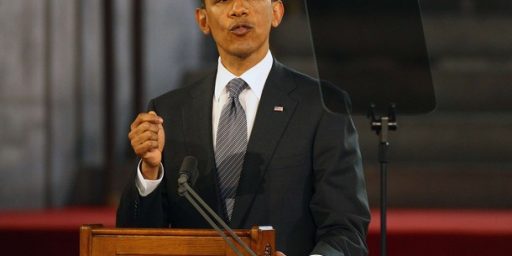Africans Denounce Media Bias
It seems that American conservatives and hawks aren’t the only ones complaining about slanted coverage. In the Christian Science Monitor, African leaders and interest groups argue that, beyond genocide, AIDS, and famine, the following stories are underreported:
Africans Ask: ‘Why Isn’t Anyone Telling the Good News?’ (CSM)
- Africa’s economies grew by more than 5 percent last year – their biggest expansion in eight years. Central Africa’s oil boom spurred 14.4 percent growth for that region.
- Ghana’s stock exchange is regularly one of the highest-performing markets in the world; in 2003, it was No. 1, gaining 144 percent, according to one analysis.
- Exports to the US from 37 African nations jumped 88 percent last year, to $26.6 billion. Jeans made in Lesotho are sold in US stores. Also, flowers from Kenya and vegetables from Senegal are regularly available in European shops.
- Use of cellphones and the Internet is growing faster in Africa than anywhere else, according to the United Nations.
[…]
“Africa is shifting more and more toward becoming a business story,” says John Chiahemen, chief Reuters correspondent in Southern Africa and chairman of the board of the Foreign Correspondents’ Association of Southern Africa. (This reporter is also a member of that board.) Increasingly, he says, Reuters is focusing on “opportunities in Africa” because the continent “has never looked more promising as a business destination.”
He cites Barclays Bank’s pending $5.5 billion purchase of 60 percent of South Africa’s largest bank, Absa, as evidence of the changing climate. It is Barclays’ biggest investment outside Britain in its 100-year history. Observers say it shows even conservative bankers can be bullish on Africa.
I think that these stories definitely deserve greater attention. For starters, perhaps the press can take a look at this recent report by the African Development Bank and the OECD Development Centre, which highlights “rising global commodity prices, the expansion of […] oil production, propitious weather conditions, and steadily prudent economic policies.” The BBC appears to be the only major international outlet that’s covered it.
Nevertheless, I find this argument misguided:
One thing blocking a fuller perception of Africa’s progress may be implicit racism, argues Charles Stith, former US ambassador to Tanzania, now at Boston University.
There’s a historic framework, he says, “that by definition sees Africa … and Africans as inferior and negative,” and makes most stories about the continent negative.
By contrast, he says, “China has problems, but we see and hear other things about China. Russia has problems, yet we see and read other things about Russia.” That same standard, he says, should apply to Africa.
The whole idea of “implicit racism” is pretty elusive, so I won’t delve into it here. But, at any rate, the comparison to China and Russia is weak. We “see and hear other things” about those countries because their GDPs exceed $1 trillion and rank within the top 10 internationally. Their economic policies reverberate beyond their borders. One need only look at Russian oil and Chinese textiles and currencies to gain this perspective. And, if we want to extend the analysis to politics, consider issues surrounding Georgia, Ukraine, and North Korea, and it’s easy to see why the press closely monitors the two big countries.
Comparatively, Africa lacks the same type of influence. It doesn’t mean that we should ignore its progress altogether, but it does mean that other regions will naturally garner more interest, racism aside.






Where’s Chrenkoff when you need him?
Funny. I thought the same thing, Jim.
That was good to see. Nice to know they’re making progress in other areas besides email scams.
Neglected is right, discriminated against is wrong, good post.
Wow, I hadn’t heard any of that. I guess I just kind of assumed that sub-saharan africa was all going down the tubes along with Nigeria, Zimbabwe, and South Africa, since that’s all I’ve heard in the news for the last few years.
So, anyone have any recommendations for a broader coverage of african affairs? Any bloggers or news sites that cover more than the horror stories?
The descrimination angle is way off mark. If someone looks at a loser for decade after decade they assume they stop paying attention after awhile. It’s as simple as that. Nobody pays much attention to Central Asia either. Even Latin America barely churns up much interest these days.
This sounds great, although beware the oil-based growth. The extra money can be used to build sustainable economies, or it can allow governments to delay reforms, which can lead to spectacular crashes if the oil price were to drop.
Of course, no one in Africa has nuclear weapons. As soon as one of them gets the “nucular” option, I guarantee they’ll get more coverage.
It would appear from the emails I’m getting that much of that oil wealth is going to leave Africa for investment in the United States as soon as they find reliable contacts to facilitate the transactions….
China gets 7 percent of its oil imports from Sudan, which is one reason they’re blocking the UN Security Council from doing anything about Darfur.
I think William was right – the positive statistics seem to be skewed by a single country’s newfound oil wealth:
http://www.cominganarchy.com/archives/2005/05/27/africa-still-in-doldrums/
We should hear some more news period from Africa. But the race monger Charles Stith’s comments are way off mark. It’s usually the pro-Africa types that are the ones who bombard us with one catastrophe story after another in order to get more money and attention from the west. Real racists don’t give a hoot about Africa period.
Anyone who believes Africa is making a progress may be interested in my wonderful beachfront property in death valley. Rampant crime, unstable governments, no rule of law, government by assassination, education slightly better than San Francisco, tribal hatreds equaled only by people forced to eat anchovies on their pizza.
Anyone who has been there, isn’t going back voluntarily unless money is involved.
Barclay’s investment in South Africa is interesting because I have been of the belief that Mbeke is damaging the SA economy pretty steadily so it is nice to read that a conservative organization like Barclay’s thinks otherwise. Its alright with me if SA succeeds. I think that there has to be healthy business for real economic growth and that seems to be happening outside the oil…like the EU and US trade figures. I’m siting here in Australia in an Eddie Bauer teeshirt made in Zimbabwe several years ago…don’t know if that is still happening but other African countries do seem to be increasingly participating in the global economy.
Looking at “growth” in africa as a whole is insanely stupid. You have to look at individual countries and examine the particulars of growth in each one.
HIV is busily erasing the educated classes of several countries in subsaharan africa. This combined with the expulsion of East Indians, Lebanese, white farmers, and other settlers from the outside has decimated the economies of most of these countries. Zimbabwe is importing Chinese to run the economy under Mugabe’s supervision. Other nations may be forced to take similar action.
If so, one wonders how educated they really are.